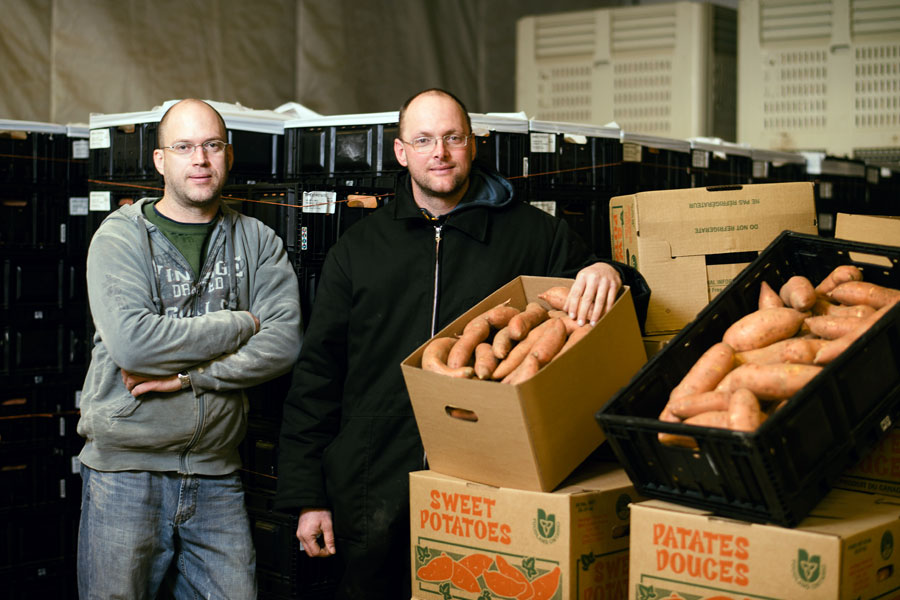I always knew I was going to start something,” says Colleen Dyck. “I just didn’t know what it was going to be or what it was going to look like.”
Of course, many people have dreams, and many people nurture a hope that they will become, build, or do something special.
It doesn’t always happen. But Dyck turned her ambition into reality.
Here’s how she did it.
If it seems a circuitous route, that may just be because in business, sometimes it seems that the straight lines aren’t always the ones that take you where you want to go.
Read Also

Sibling squeeze part 6: The emotional stakes of a family legacy
The final instalment in a six-part series exploring the challenges of sibling conflict and the effect it can have on…
Dyck began by studying business administration with a major in entrepreneurship at Winnipeg’s Red River College. When she finished college, she applied for a job at aircraft engine specialist Standard Aero, where she got her first taste of how business works in the real world.
Next, Dyck switched to Mountain Equipment Co-op (MEC) to be part of an industry she felt more passionate about.
That in turn gave Dyck more opportunities to spend much more time outside, which then led to her participation in triathlons.
Now an extreme athlete, Dyck realized she needed extreme food. “Extreme athletes typically look for a convenient source of fuel to keep them going and going,” says Dyck. For her, the best answer seemed to be energy bars.
During her search for fuel-filled energy bars, however, Dyck learned that the energy foods on most supermarket shelves were packed with preservatives and additives that are turn offs to many athletes, and she began experimenting and making home made energy bars.
Dyck shared her bars with other athletes; they all wanted more. And thus, a new business was born.
“I’ve always been really careful about what I put in my body,” Dyck says. “One of my favourite sayings is ‘Food is a tool. What are you building?’”
After researching what she wanted in an energy bar, Dyck began sourcing the best ingredients she could get her hands on, with a mindset of “first local, and second organic.”
Growing up in the small southern Manitoba town of Niverville, at the age of 18, Dyck moved to Edmonton. Eventually, the Prairies called her back.
In her early 20s, Dyck had been certain she would never marry a farmer — yet, that is exactly what she ended up doing — and now she has re-discovered a huge passion for agriculture.
Dyck’s husband’s father was a farmer who passed away early. Grant (Dyck’s husband) had big shoes to fill while he was in his own early 20s, taking over a large family farm at that time (7,000 acres). “He took this on and a lot of our staff who had worked for his dad stayed on the team and worked with him, which he was really grateful for,” says Dyck. “Grant managed to grow and keep the farm, and we didn’t go under.”
They also learned to transform their challenges into opportunities. “When our old farmhouse burned down,” Dyck recalls, “we knew I had this energy bar idea to pursue, so when we rebuilt, we built the basement to be at a level suitable for a food-handling facility.”
While the farm — now at 14,000 acres — is still the Dycks’ main business, its proximity to Niverville has been a blessing for the energy bar business with, as of now, Dyck not quite yet needing full-time production workers.
As for the bars’ ingredients, Dyck sources most of her supplies locally, importing “southern” items such as coconut, peanuts, and brown rice protein.
Finding just the right protein was one of the more difficult tasks. Athletes are under stress, Dyck says. She needed to find a source that wouldn’t upset their stomachs. “There are just so many cheap proteins out there that upset the gut and have a lot of fillers in them,” says Dyck.
After intensive research, Dyck found an excellent brown rice protein that is hypo-allergenic and made in the U.S.
“Something I hear from a lot of people is that the bars sit really well on the stomach — actually, something many of the Winnipeg Jets have mentioned,” says Dyck. “The Jets have been using the bars since they returned to Winnipeg.”
To develop the bar, Dyck went to the Food Development Centre in Portage la Prairie, which was costly and, partly, the reason it took as long as it did to get the bars onto the market.
“Eventually, we got a recipe that worked and then it was just a matter of getting my hands on some loans,” says Dyck. “Through the Women’s Enterprise Centre, which gives funding to women specifically, I got to buy the packaging machine I needed. This was the missing piece — a big ticket item I needed to get started.”
From the Manitoba Co-operator website: Women’s Business Network supports rural women entrepreneurs
Dyck began by making the bars available locally, giving away free samples at local fun runs and marathons. She also gave out samples at the Swamp Donkey Adventure races, partnering with race organizers and showing up at all the races, giving away samples and conducting taste tests to gradually get the Gorp name out there.
It didn’t take long for satisfied customers to start doing the selling of the bars through word of mouth, telling others how good they are. Today, Dyck regularly receives telephone calls from retailers, informing her of the many customers who come to their stores asking for the product.
Home grown ingredients
“We try to grow the ingredients on the farm that go into the bar, but once you send the crops to the processor, they get mixed with crops from other area farms,” says Dyck. “Then we buy product back from them, so I can’t necessarily say it all comes from our farm.”
The Dycks work hard to grow as many of the ingredients and buy locally back from the processors in their own backyard — including oats, sunflower seeds, hemp, flax and honey, as well as prairie-grown pea fibre.
Dyck is also working to find ways to cut gluten from her products, as this seems of increasing value to consumers.
Overall, Dyck believes whether it comes to gluten-free, organic, or other more specialty elements, “There are many different ways to grow food and feed the planet. As long as we’re moving forward and trying to do better, we’re going to get better.”
The making of the Gorp bars is currently a fairly manual process. “After having tried a bunch of different machines when we were at the Food Development Centre, we just ended up crushing the bar to smithereens — to the point you could barely tell you were biting into an almond,” said Dyck.
“I thought we’d just do it the old-fashioned way until we could afford the machine, still keeping the texture and integrity of the bite.”
After all the ingredients are combined in a large mixer, the rolling crew rolls them out by hand, with about eight people around a long table rolling batch after batch.
Dyck went to a local welding shop and custom-designed a cutting machine to cut the bars. In fact, much of the equipment for rolling, forming, and other operations is custom-made locally.
The bars go into a packaging machine (a conveyor that wraps the printed packaging). Then they are packed by hand into boxes and shipped out.
The energy bars are shipped mainly to locations in Manitoba, but sales are building across the country, and Dyck’s goal for 2014 is to build Gorp into a national brand.
That means forging relationships with national retailers, such as Mountain Equipment Co-op (MEC) which plans to stock their shelves across Canada with Gorp bars after having tested them in 2013 in their Winnipeg location.
Next on the horizon for Dyck is to expand the Gorp bars’ production to a new location in the yard. Dyck will retrofit an older shop building, and although the building isn’t very big, it is situated right on the yard — keeping production local.
In Winnipeg, Gorp bars are available at health retail outlets, such as Vita Health, Nutrition Plus, Organza, Sunrise Health Foods, and Humboldt’s, as well as at some chiropractic offices and fitness centres.
“Usually, these kinds of energy bars sell for around $3,” said Dyck. “Ours sell for about $3.25 to $3.49.
“We have a lot of repeat customers,” Dyck says.
There are three different kinds of Gorp bars: cocoa, hemp, and almond; peanut butter and apple; peanut butter and raspberry.
“We’re always thinking about new flavours,” says Dyck. “There are new products that have been shelf-life tested and that we’re about to launch in the next couple of months. We’re not quite talking about them yet, but soon.”















